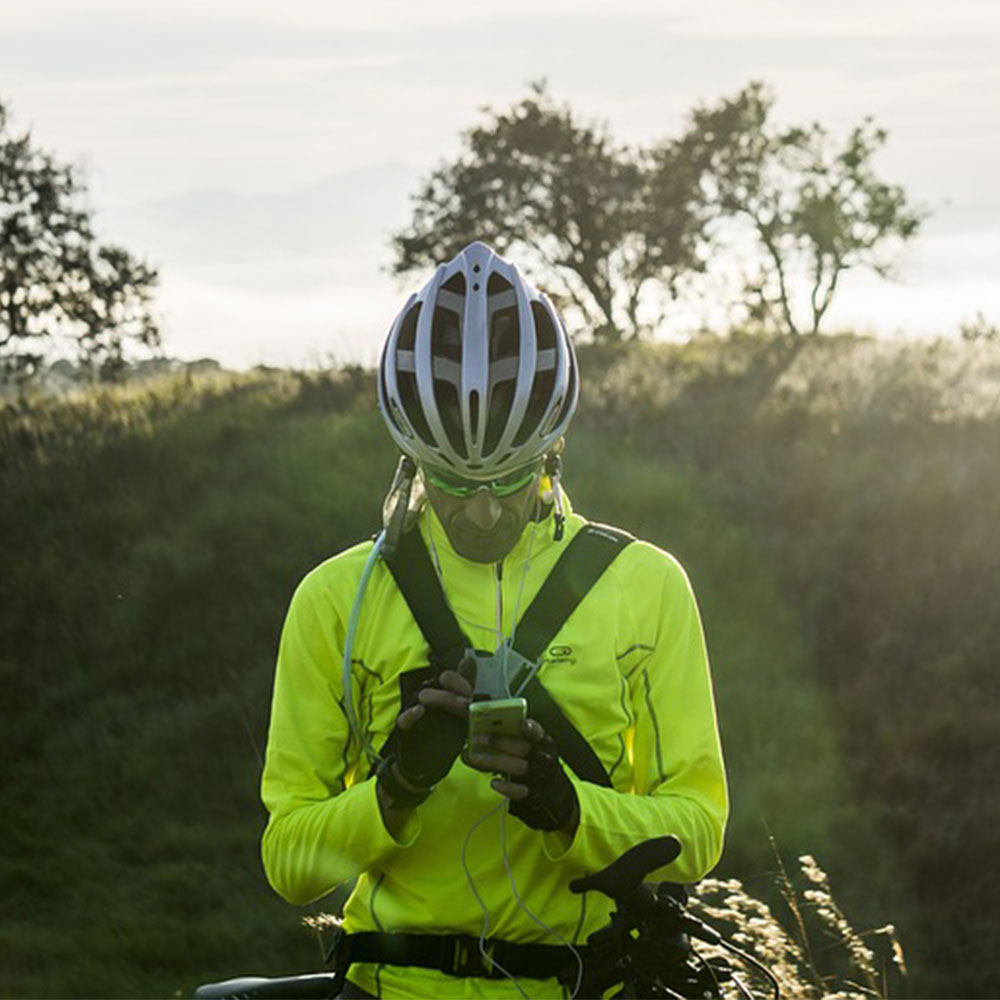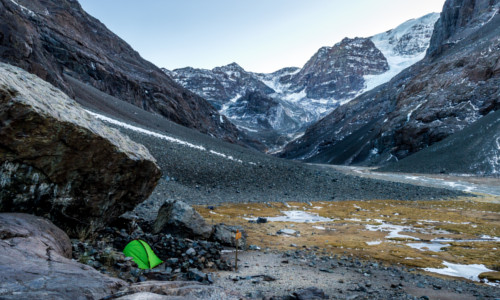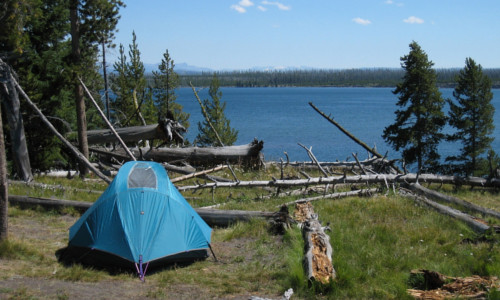8 Tips for Choosing the Ideal Campsite
Author

Chris shares his passion for cycling, hiking, skiing, and climbing from Buxton, in the Peak District. As a blogger for Outdoor Look, Chris shares outdoor tips and indoor tricks to help you get the most out of your time spent outside. When he's not out adventuring he's making videos or trying to keep up with his 4-year-old son.
 Camping is a perfect way to spend some quality time with your friends or family. It makes for awesome memories and some fun stories to remember. But how do you choose an ideal campsite? The basic idea is to find a campsite where you can easily set camp, play some games and make some wonderful memories. Here is the checklist you should refer to while choosing an ideal campsite for a group of people.
Camping is a perfect way to spend some quality time with your friends or family. It makes for awesome memories and some fun stories to remember. But how do you choose an ideal campsite? The basic idea is to find a campsite where you can easily set camp, play some games and make some wonderful memories. Here is the checklist you should refer to while choosing an ideal campsite for a group of people.
1. Convenience or Privacy
Perhaps the most important factor is privacy. Do you wish to trek the woods and camp into a decent vicinity or would you just like to find somewhere convenient and easy to access. Find out about the places where you can park the car if you wish to leave it behind. When camping with kids the convenience of the camping spot has a higher priority, but if you are camping with friends, a little privacy is always good.
2. Reservation
If you are going for an established campsite, availability needs to be checked beforehand so that you get to camp on the site of your choice. But if you are going for stealth camping, pick a nice flat and even spot to set camp.
3. Choice of Activities
Pick a campsite where you can easily do a lot of activities that everyone in your group can take part in. If you are planning a trip with kids, find a place where you can play with them. Otherwise, you can pick a campsite near a hiking trail, next to a lake if you enjoy fishing or some place that offers activities which your family enjoys.
4. View
Places of natural beauty make memories more pleasant and are a fine place to harvest those much-needed likes on your social media site of choice. An obvious choice is a campsite with a breath-taking backdrop, nice and fresh air and what not. Pick a spot that offers the scenery and trees for some shade.
5. Availability of Firewood
If you are planning for a campfire, you need to research about the availability of firewood. Established campgrounds sell firewood, some have plenty of firewood available for you to gather while in other places you may need to carry your own. You can also try camping without a campfire if you are not sure about the availability of firewood.
6. Proximity to a Water Source
The obvious choice for camping is near a water source as you will need it for drinking, cooking and clean up. But my choice is to camp at least 200 feet away from the water source so that you can easily fetch water for your use and save yourself the inconvenience put up by bugs and flash floods.
7. Check for Fire Bans
Many camping sites put fire bans in place according to season and climate, in order to prevent the spread of a wildfire. These fire bans may even be put just for a week. Check ahead before going if there is an ongoing fire ban or not. If there is a fire ban, plan for some interesting night time activities.
8. Consider Others
You will find a lot of people camping and trekking when you are out for camping. Try to choose a camping site that does not clutter the space for others, at least if there are other choices available. Also, try not to block the view of the scenery for other campers. Blending with the nature is the best way to enjoy a camping trip.
Selecting a camping site carefully can alter your whole experience for the better. Practice 'no trace' principles while camping. Leave no rubbish behind, and if you find some garbage left by the previous campers, try and collect it. Saving nature is a necessity and a wonderful experience in itself. Plan ahead and make some evergreen memories.
Author

Chris shares his passion for cycling, hiking, skiing, and climbing from Buxton, in the Peak District. As a blogger for Outdoor Look, Chris shares outdoor tips and indoor tricks to help you get the most out of your time spent outside. When he's not out adventuring he's making videos or trying to keep up with his 4-year-old son.
- Speed Up Your Post-Hike Recovery with These 6 Essential Tips
- Cycling through Tranquil Roads and Coastal Views on the Isle of Wight
- The Essential Guide to Hiking Safety: 5 Tips Every Hiker Should Know
- Run Smart, Run Strong: Your Guide to Injury-Free Running
- Embrace Biking: Essential Tips for Beginners
Categories
- Sport (28)
- Product Reviews (3)
- Team Outdoor Look (7)
- Mike Wild (2)
- Mike Payton (2)
- Suse Hammond-Pears (3)
- Snowboarding (12)
- Latest Offers (105)
- Shop Talk (1)
- Competitions (7)
- Walking (413)
- Lifestyle Fashion (8)
- Travel (86)
- Kit Guides (176)
- Workwear Clothing (6)
- Safety Workwear (4)
- Health/Fitness (289)
- Skiing (91)
- Great Outdoors (1316)
- Cycling (92)
- January 2025
- December 2024
- November 2024
- October 2024
- September 2024
- August 2024
- July 2024
- June 2024
- May 2024
- April 2024
- March 2024
- February 2024
- January 2024
- December 2023
- November 2023
- October 2023
- September 2023
- August 2023
- July 2023
- June 2023
- May 2023
- April 2023
- March 2023
- February 2023
- January 2023
- December 2022
- November 2022
- October 2022
- September 2022
- August 2022
- July 2022
- June 2022
- May 2022
- April 2022
- March 2022
- February 2022
- January 2022
- December 2021
- November 2021
- October 2021
- September 2021
- August 2021
- July 2021
- June 2021
- May 2021
- April 2021
- March 2021
- February 2021
- January 2021
- December 2020
- November 2020
- October 2020
- September 2020
- August 2020
- July 2020
- June 2020
- May 2020
- April 2020
- March 2020
- February 2020
- January 2020
- December 2019
- November 2019
- October 2019
- September 2019
- August 2019
- July 2019
- June 2019
- May 2019
- April 2019
- March 2019
- February 2019
- January 2019
- December 2018
- November 2018
- October 2018
- September 2018
- August 2018
- July 2018
- June 2018
- May 2018
- April 2018
- March 2018
- February 2018
- January 2018
- December 2017
- November 2017
- October 2017
- September 2017
- August 2017
- July 2017
- June 2017
- May 2017
- April 2017
- March 2017
- February 2017
- January 2017
- December 2016
- November 2016
- October 2016
- September 2016
- August 2016
- July 2016
- June 2016
- May 2016
- April 2016
- March 2016
- February 2016
- January 2016
- December 2015
- November 2015
- October 2015
- September 2015
- August 2015
- July 2015
- June 2015
- May 2015
- April 2015
- March 2015
- February 2015
- January 2015
- December 2014
- November 2014
- October 2014
- September 2014
- August 2014
- July 2014
- June 2014
- May 2014
- April 2014
- March 2014
- February 2014
- January 2014
- December 2013
- November 2013
- October 2013
- September 2013
- August 2013
- July 2013
- June 2013
- May 2013
- April 2013
- March 2013
- February 2013
- January 2013
- December 2012
- November 2012
- October 2012
- September 2012
- August 2012
- July 2012
- June 2012
- May 2012
- April 2012
- March 2012
- February 2012
- January 2012
- December 2011
- November 2011
- October 2011
- September 2011
- August 2011
- May 2010
- April 2010
- March 2010
- February 2010
- January 2010
- November 2009
- October 2009
- September 2009
Submit a Comment